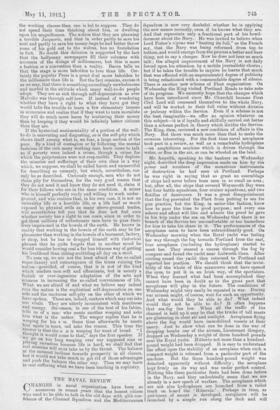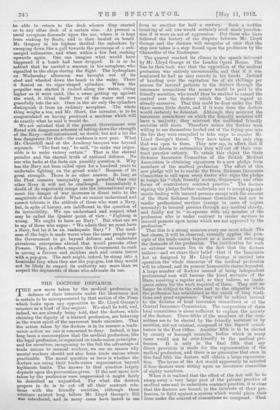THE NAVAL REVIEW- C HANGES in naval organization have been so
• numerous in recent years that the honest citizen who used to be able to talk in the old days with glib con- fidence of the Channel Squadron and the Mediterranean Squadron is now very doubtful whether he is applying the new names eorreetly, even if he knows what they are. And that represents only a fractional part of his bewil- derment about the Navy. He was invited to believe when Lord Fisher's rjgime was "beating its full," as the French say, that the Navy was being reformed from top to bottom, and would emerge from the process a better and finer thing, not to say a cheaper. Now he does not hear so much talk ; the alleged improvement of the. Navy is not daily forced upon his attention by a mobile journalistic chorus ; but if he takes the trouble to inquire he learns that much that was effected with an unprecedented degree of publicity is being refashioned with a commendable degree of silence. There is another new scheme of Fleet organization. On Wednesday the King visited Portland Roads to take note of its progress. We earnestly hope that the changes which have been introduced since Mr. Churchill became First Civil Lord will commend themselves to the whole Navy, and will be worked to their full value without division or jealousy within the Service. Even if a scheme is not the best imaginable—we offer no opinion whatever on this subject—it is if loyally and skilfully carried out better than a scheme perfect in theory which divides the Service. The King, then, reviewed a new condition of affairs in the Navy. But there was much more than that to make the occasion interesting. For the first time naval aeroplanes took part in a review, as well as a remarkable hydroplane —an amphibious machine which is driven through the water, or flies in the air, or can be wheeled on the land.
Mr. Asquith, speaking to the bankers on Wednesday night, described the deep impression made on him by the power and numbers of the monstrous instruments of destruction he had seen at Portland. Perhaps he was right in saying that so great an assemblage of ships had never before been seen in so small an area ; but, after all, the ships that covered Weymouth Bay were but four battle squadrons, four cruiser squadrons, and two flotillas of destroyers. It was a great disappointment that the fog prevented the Fleet from putting to sea for gun practice, but the King, in sailor-like fashion, knew how to pass the time to good purpose ; and every one ashore and afloat will like and admire the proof he gave in his trip uudor the sea on Wednesday that there is no branch of the Service too uncomfortable or too hazardous for him to take his share in it. The performances of the aeroplanes seem to have been extraordinarily good. On Wednesday morning when the Royal yacht was feeling her way through the fog towards Portland from the east, four aeroplanes (including the hydroplane) started to meet her. They steered a. course through the fog by compass and found the yacht near Lulworth Cove. After circling round the yacht they returned to Portland and reported her position. We should think that the invisi- bility of the whole of this manoeuvre must have opened the eyes, to put it in an Irish way, of the spectators. When they learned what had been accomplished they cannot have been in doubt as to the great part that aeroplanes will play in the future. The conditions of Wednesday might very easily be repeated in war. During war airmen might., of course, wait for such an opportunity. And what would they be able to do P What indeed would they not be able to do ? It often happens that sea-fog lies low. When all the traffic of the channel is held up it may be that the trucks of tall masts are glistening in clear air and sunlight. Aeroplanes flying i above the fog would have immobilized vessels at their mercy. Just to show what can be done in the way of dropping bombs one of the airmen, Lieutenant Gregory, dropped on Wednesday a weight of three hundred pounds near the Royal yacht. Hitherto not more than a hundred- pound weight had been dropped. It is easy to understand the effect upon the stability of an aeroplane when such a compact weight is released from a particular part of the machine. But the three hundred-pound weight was detached apparently without difficulty ; the aeroplane kept firmly on its way and was under perfect control. Nothing like these particular feats had been done before in the Navy, and they undoubtedly mean that we are already in a new epoch of warfare. The aeroplanes which are not also hydroplanes are launched from a railed track on board the ' Hibernia.' . Perhaps in time, as quickness of ascent .is developed, . aeroplanes . will be launched by a simple run along the deck and will be able to return to the deck whence they started or to any other deck of a certain size. At present a naval aeroplane descends upon the sea, where it is kept from sinking by floats, and is then hauled on board. Mr. Gregory in his biplane thrilled the onlookers by swooping down like a gull towards the periscope of a sub- merged submarine, and when within a few feet rushing upwards again. One can imagine what would have happened if a bomb had been dropped. It is to be noticed that he carried a seaman in his aeroplane, who signalled to the ships during the flight. The hydroplane on Wednesday afternoon was brought out of its shed and wheeled down the beach to the water. There it floated on its cigar-shaped cylinders. When the propeller was started it rushed along the water, rising higher as it went until, like a swan getting up against the wind, it lifted itself free of the water and rose gracefully into the air. Once in the air only the cylinders distinguish it from an ordinary aeroplane. The whole thing weighs a ton, and Mr. Short, the inventor, is to be congratulated on having produced a machine which will do exactly what he said it would do. We are satisfied that if the present Government ever flirted with dangerous schemes of letting down the strength of the Navy—well-intentioned, no doubt, but not a bit the less dangerous for that—the madness is now past. What Mr. Churchill said at the Academy banquet was beyond reproach. " The best way," he said, " to make war impos- sible is to make victory certain." That is the eternal paradox and the eternal truth of national defence. No one who looks at the facts can possibly question it. Why has the Navy not been called upon for a hundred years to undertake fighting on the grand scale ? Because of its great strength. There is no other answer. So long as the Fleet remains unarguably more powerful than any other Navy it will not be challenged. Immediately a, doubt of its superiority creeps into the international argu- ment the danger of war increases in direct ratio to the magnitude of that doubt. What we cannot understand and cannot tolerate is the attitude of those who want a Navy, but, in spite of history, are indifferent to the question of its invincibility. We can understand and respect what may be called the Quaker point of view : " Fighting is wrong. We ought to have no Navy." But what are we to say of those who argue : " We admit that we must have a Navy, but let it be an inadequate Navy " ? The mad- ness of the logic is made worse when the same people urge the Government to go beyond defence and undertake chivalrous enterprises abroad that would provoke other Powers. They, in effect, require the Government to rush in among a furious and reckless mob and create terror with a pop-gun, The mob might, indeed, be stung into a homicidal fury when they saw the pop-gun, but they would not be likely to respect its authority any more than we respect the arguments of those who advocate its use.











































 Previous page
Previous page